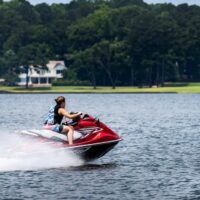Pennsylvania Requirements to Operate a Boat or Personal Watercraft

Summer is officially here, and summer vacation is well underway for most Pennsylvanians, and that means it is time to hit the water. Pennsylvania is home to countless lakes, rivers, and reservoirs, offering residents and visitors ample opportunities for boating and water recreation. Whether you’re taking a leisurely cruise, fishing, or enjoying the thrill of riding a personal watercraft (PWC), it’s essential to understand the legal requirements for operating these vessels. Pennsylvania has established specific rules to promote safety on the water, and failing to comply with these laws can result in fines, penalties, or even accidents.
Here’s a comprehensive overview of Pennsylvania’s requirements for operating boats and personal watercraft. If you or a loved one has been hurt on the waters in and around Philadelphia, contact Benedum Law to speak with a dedicated Chestnut Hill boating accident lawyer.
Boating Safety Education Certificate
One of the most important requirements in Pennsylvania is the boating safety education certificate. Anyone born on or after January 1, 1982, must have this certificate to legally operate a boat powered by engines greater than 25 horsepower. This requirement also applies to operators of personal watercraft regardless of age.
To obtain the certificate, individuals must successfully complete a boating safety course approved by the Pennsylvania Fish and Boat Commission (PFBC). These courses are available in person, online, and through home-study programs. Upon completion, operators receive a lifetime certificate that must be carried on board whenever they are operating the vessel.
Even for those not legally required to have the certificate, taking a boating safety course is highly recommended. These courses provide essential knowledge about navigation, emergency procedures, boating laws, and safe practices that can make a significant difference on the water.
Minimum Age Requirements
Pennsylvania sets age restrictions for boat and personal watercraft operators to ensure that individuals have the necessary maturity and judgment to handle these vessels safely. Children under the age of 12 are not permitted to operate boats with more than 25 horsepower. Additionally, no one under 12 is allowed to operate a personal watercraft, regardless of engine size or supervision.
Operators of personal watercraft must be at least 12 years old and must carry their boating safety education certificate. Since PWCs can travel at high speeds and are particularly susceptible to quick changes in direction, the state requires a baseline of training and age-appropriate responsibility before allowing young operators to use them.
Registration and Titling Requirements
All motorboats, including personal watercraft, must be properly registered with the Pennsylvania Fish and Boat Commission. The registration process involves submitting an application, paying the required fees, and displaying the issued registration number and validation decals on the vessel.
In addition to registration, certain boats must also be titled. Boats that are powered by motors and are model year 1997 or newer, as well as all personal watercraft, must have a valid title issued by the state. The title serves as proof of ownership and is necessary for selling, transferring, or financing the vessel.
Operating an unregistered or improperly titled boat can lead to penalties and enforcement action. Keeping all documentation current ensures that you remain in compliance with Pennsylvania law.
Personal Flotation Devices (PFDs) and Safety Equipment
Pennsylvania law mandates that each person on board a boat or personal watercraft must have access to a U.S. Coast Guard-approved personal flotation device (PFD). For personal watercraft, life jackets must be worn at all times while operating or riding. Life jackets are also required for anyone being towed behind a boat on devices like tubes or water skis.
Children under the age of 13 must wear a life jacket at all times while on a boat that is less than 20 feet in length or while in canoes and kayaks. Pennsylvania also requires boats to carry other essential safety equipment, such as sound-producing devices like whistles or horns, navigation lights, and fire extinguishers when applicable.
Carrying the appropriate safety equipment is not just a legal requirement but a critical component of responsible boating. In the event of an emergency, proper gear can prevent serious injury or loss of life.
Operating Rules and Restrictions
Operators of boats and personal watercraft must comply with the “Rules of the Road” for boating, which dictate navigation priorities, speed limits, and right-of-way protocols. Pennsylvania enforces speed restrictions in certain areas, particularly near marinas, docks, and swimming zones. Boaters should also be aware of no-wake zones where vessels must travel at the slowest speed possible to maintain steering control.
Alcohol use is strictly regulated on Pennsylvania waterways. Operating a boat or personal watercraft while under the influence of alcohol or drugs is illegal and carries similar penalties to driving under the influence on land. Law enforcement officers regularly patrol popular boating areas and may conduct sobriety checks to ensure compliance.
Why Compliance Matters
Understanding and following Pennsylvania’s boating and PWC regulations is crucial not just to avoid fines but to protect yourself, your passengers, and others sharing the water. Boating accidents can have serious, life-altering consequences. Taking the time to obtain proper certification, using the right safety equipment, and operating responsibly can greatly reduce the risk of accidents.
Injured on the Water in Philadelphia? Contact Benedum Law Today.
If you or a loved one has been injured in a boating or personal watercraft accident in Pennsylvania, Benedum Law is here to help. Our firm has the experience to handle complex injury claims and can guide you through the legal process to pursue fair compensation. Contact us today for a free consultation and learn how we can assist you in your recovery.